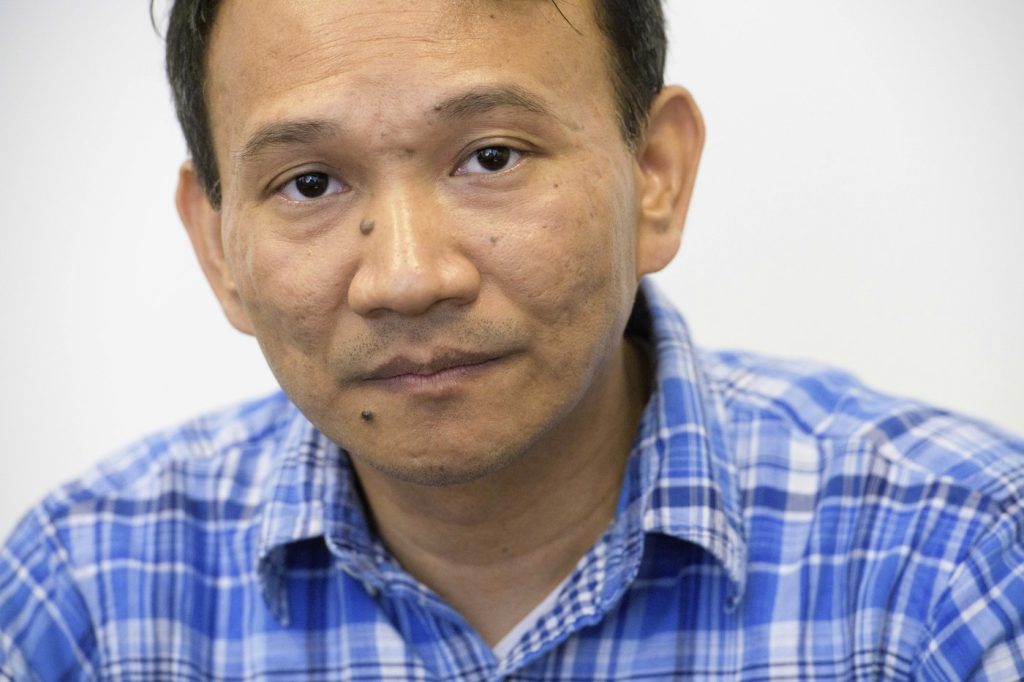Two Cambodian journalists, Vuthy Tha and Hour Hum, have relocated to the United States after spending seven years in Thailand. They arrived last year on work visas, with the intention of continuing to provide factual news through Radio Free Asia (RFA) to their home country. However, both journalists now find themselves in precarious situations as their jobs and immigration status are jeopardized by President Donald Trump’s recent executive order that significantly reduces funding for the U.S. Agency for Global Media (USAGM), which supports RFA and other media outlets operating in regions lacking free press.
Vuthy Tha, who is also a single father of two, expressed his dismay about the impact of the Trump administration's decision, stating that it threatens to disrupt his life and his ability to inform listeners in Cambodia about accurate news. Hour Hum echoed this sentiment, expressing regret over the potential loss of reliable news for their audience back home. Both journalists fear for their safety and livelihood, as returning to Cambodia poses grave risks due to the country's single-party state and hostility towards independent journalism.
The USAGM, which has been undergoing significant cutbacks under the Trump administration, is crucial in funding various news outlets that provide uncensored information to authoritarian regimes. As a result of these budget cuts, USAGM-affiliated journalists, including Vuthy and Hour, are facing possible deportation back to countries where they have been persecuted for their work. There are concerns that the dismantling of these services could lead to increased danger for these journalists, especially as some have already faced imprisonment overseas for their reporting.
As the situation unfolds, reports indicate that 11 journalists associated with USAGM are currently imprisoned overseas. Additionally, a coalition of human rights organizations, including Reporters Without Borders, has asserted that at least 84 journalists on work visas in the U.S. face deportation, with a notable number at high risk of arrest upon their return to their home countries.
Thibaut Bruttin, the director general of Reporters Without Borders, condemned the Trump administration’s order, stating that it amounts to abandoning courageous journalists who sacrifice their safety for the principles of democracy and press freedom. The U.S. Congress has a moral and legal responsibility to protect these journalists and the outlets funded by its own budget. Meanwhile, the State Department has affirmed that it is coordinating efforts regarding imprisoned journalists and denouncing the unjust detention of those who exercise their freedom of expression.
A federal lawsuit has been filed by several journalists from Voice of America (VOA), another USAGM-controlled entity, including two foreign journalists whose visas are at stake. This legal action has temporarily halted contract terminations that could have forced these journalists, facing severe threats in their countries, to return. In conjunction, both RFA and Radio Free Europe/Radio Liberty are also pursuing lawsuits to restore their funding amidst the cuts.
With the reduction of resources, there are fears that American support for imprisoned journalists could dwindle. Journalists like Khoa Lai from Vietnam, who joined RFA only days before the executive order, expressed serious apprehensions about the possibility of returning home, where he could face prosecution or imprisonment for his reporting on sensitive issues such as freedom of speech and political corruption.
Both Vuthy and Hour began their journalistic careers in Cambodia but were forced to leave due to escalating political repression against independent media. After establishing their lives as refugees in Thailand, they continued their work via RFA, albeit with hidden identities. Their relocation to the U.S. represented a new beginning, yet now they find themselves uncertain about their future amid looming government cuts and the threat of deportation to a place where their lives could be endangered.
The political landscape in Cambodia, particularly under the leadership of former Prime Minister Hun Sen and his successor Hun Manet, remains antagonistic towards dissenting voices. In this context, Vuthy continues to hold onto hope for RFA’s resilience, asserting that the outlet is fighting for its existence in a challenging environment as it strives to maintain its mission of delivering unbiased news to its audience in Southeast Asia.










